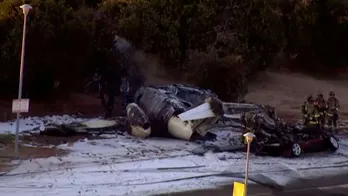Lung cancer: Types, symptoms and treatment options
It's one of the most common cancers in the United States: Over 238,000 people are diagnosed with lung cancer each year.
Smoking is one of the factors that plays a large role in the emergence of lung cancer.
It is a cancer seen overwhelmingly in those who are over the age of 65.
HOW YOU CAN GET LUNG CANCER, EVEN IF YOU DON'T SMOKE
Understand lung cancer, its symptoms and treatments for the disease in order to best prevent a future diagnosis.
Here are important points to know.

Lung cancer is seen overwhelmingly in those who are over the age of 65. (iStock)
- What is lung cancer?
- What are the common signs of lung cancer?
- Is lung cancer usually fatal?
- How is lung cancer found?
- What are treatments for lung cancer?
1. What is lung cancer?
An individual is diagnosed with cancer when cells begin to grow out of control in the body. For lung cancer, this cell growth starts in the lungs.
There are two main types of lung cancer.
The most common is non-small cell, which accounts for 80%-85% of lung cancer cases.
VACCINES COULD BE THE NEXT BIG BREAKTHOUGH IN CANCER TREATMENT
The other type is small cell lung cancer. This type makes up around 10%-15% of lung cancer cases.

Smoking is one of the biggest risk factors in the development of lung cancer. (iStock)
2. What are the common signs of lung cancer?
There are many symptoms an individual can experience if diagnosed with lung cancer.
The most common signs of lung cancer, according to the American Cancer Society, are a cough that will not go away or gets progressively worse. Other symptoms include coughing up blood, chest pain, hoarseness, loss of appetite, unexplained weight loss and shortness of breath.
Those with lung cancer may also get recurring cases of bronchitis and pneumonia.
3. Is lung cancer usually fatal?
Lung cancer is typically a fatal disease. More than half of the people who are diagnosed with lung cancer die within a year of being diagnosed, according to the American Lung Association.
When the disease is caught early, the survival rate is higher than when it isn't caught until later on in life, since at later stages it is likely the disease has spread.
4. How is lung cancer found?
Lung cancer is usually found in an individual through the use of imaging tools.
CLICK HERE TO SIGN UP FOR OUR LIFESTYLE NEWSLETTER
This could be through a chest X-ray or a CT, MRI or PET scan.

Lung cancer is typically found through a type of imaging scan, like an X-ray or CT scan. (iStock)
A CT scan allows doctors to see lung tumors that are present.
An MRI is usually used to see how and if the cancer has spread to other parts of the body.
CLICK HERE TO GET THE FOX NEWS APP
Scans like these help doctors spot the cancer, determine the degree of spread and assess if a certain treatment option is effective.
5. What are treatments for lung cancer?
The most common treatments for lung cancer are surgery, chemotherapy, radiation therapy and targeted therapy.

The treatment for lung cancer depends on the type and the severity of the disease. (BSIP/Universal Images Group via Getty Images)
The treatment chosen by doctors is going to depend heavily on both the type of lung cancer, small cell or non-small cell, and how severe the case may be.
Disclaimer: The copyright of this article belongs to the original author. Reposting this article is solely for the purpose of information dissemination and does not constitute any investment advice. If there is any infringement, please contact us immediately. We will make corrections or deletions as necessary. Thank you.







